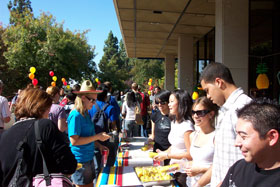Jan and Bud Richter Center
The Value of Service-Learning
 Numerous studies have chronicled college students’ lack of trust in large social institutions,
declining interest in politics, and decreasing civic skills (Colby, Ehrlich, Beaumont,
and Stephens, 2003; Colby & Ehrlich, 2007). On the other hand, students nationally
and at Fresno State are participating in community service and service-learning in
increasing numbers.
Numerous studies have chronicled college students’ lack of trust in large social institutions,
declining interest in politics, and decreasing civic skills (Colby, Ehrlich, Beaumont,
and Stephens, 2003; Colby & Ehrlich, 2007). On the other hand, students nationally
and at Fresno State are participating in community service and service-learning in
increasing numbers.
Students come to college to prepare for lives of personal satisfaction and rewarding careers. They are also open to service, but want to connect their service to larger social problems (Campus Compact, The New Student Politics, 2002). As Levine and Cureton found, “Today’s students need to believe they can make a difference.... But at the same time they are not convinced that they can both do good and do well” (1998, p. 158).
In his 1996 article, “The Scholarship of Engagement”, Ernest Boyer points out that community engagement on campus occurs best in the context of a supportive academic culture. Furthermore, Boyer states “I have this growing conviction that what’s also needed is not just more programs, but a larger purpose, a larger sense of mission, a larger clarity of direction in the nation’s life …. Increasingly, I’m convinced that ultimately, the scholarship of engagement also means creating a special climate in which the academic and civic cultures communicate more continuously and more creatively with each other, … enriching the quality of life for all for us.”
The Association of American Colleges and Universities states that college students must become intentional learners who are empowered, informed, and responsible: “Through discussion, critical analysis, and introspection, they come to understand their roles in society and accept active participation. Open-minded and empathetic, responsible learners understand how abstract values relate to decisions in their lives. Responsible learners appreciate others, while also assuming accountability for themselves, their complex identities, and their conduct. By weaving moral reasoning into the social fabric of life and work, they help society shape its ethical values, and then live by those values” (2002, p. 23).
Higher education civic engagement efforts are supported by numerous national associations, including: the American Association of Schools, Colleges and Universities (AASCU), American Association of Higher Education (AAHE), The Carnegie Foundation, Campus Compact, and many discipline specific organizations. It is also aligned with the guiding documents of the CSU system and those of California State University, Fresno, which was one of the first university’s in the nation to earn the Carnegie Foundation classification of a “community engagement” institution.
Since the early 1990’s, service-learning has been one of the primary ways colleges and universities have engaged students in the community and fostered the civic skills of students. Research documents the power service-learning has to help students develop personally, professionally and academically. Dozens of Fresno State faculty members and thousands of our students have witnessed this first-hand from their involvement in service-learning.